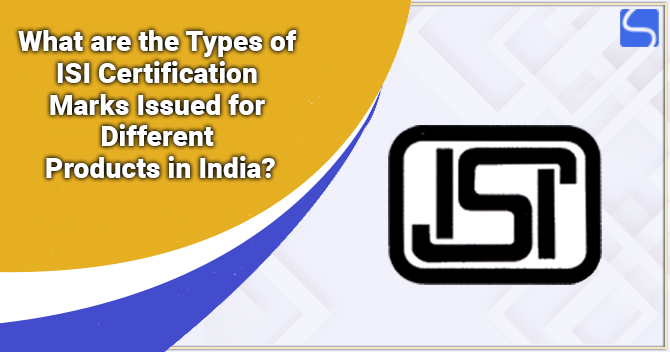The process to get ISI Mark Certification for the Automobile industry

Ganesh Nair | Updated: Aug 30, 2022 | Category: ISI Certification
Table of Contents
What is ISI Mark?
ISI stands for Indian Standard institute. It has been responsible for setting compliance standards for industrial products since 1955. The mark proves that a product has met the standards developed by the Bureau of Indian Standards. It is essential for an industrial product to bear this mark as it provides authenticity and assurance to the buyer.
Products such as motors, cables, switches, heaters, LPG valves, automotive tyres etc., must get a mandatory ISI mark. In the case of other products, it is optional, and manufacturers will determine whether to get an ISI mark or not.
What is the importance of an ISI license?
An ISI Mark registration is essential for a manufacturer. A product that carries the ISI mark indicates that the product is of high quality and safe to use. This creates a relationship of trust between the manufacturer and the consumer.
Standards for the Automotive industry:
In the past years, India has been making vital progress in developing its domestic economy and is also making it easier to attract foreign investments. Along with this the Make In India campaign has picked up the pace; the campaign also extends to automobile and automotive components. To excel in the automobile sector, India must create regulations for manufacturers that can compete with international standards of safety and durability.
India has prepared the guidelines for the automobile industry in two forms:
- Automotive Industry Standard (AIS)[1]
- Indian Standard Institute (ISI)
This blog shall exclusively discuss the latter, i.e. the ISI Mark Certification for the Automobile industry.
What components should undergo ISI certification for the automobile industry?
Some of the components that require mandatory ISI certification are:
| S.no | ISI-Number | Category | Products |
| 1. | IS 13098 | Automotive Vehicles | Tubes for Pneumatic Tyres-specification |
| 2. | IS 15627 | Automotive Vehicles | Pneumatic Tyres For Two And Three-wheeled Motor Vehicles |
| 3. | IS 15633 | Automotive Vehicles | Pneumatic Tyres for Passenger Car Vehicles – Diagonal And Radial Ply |
| 4. | IS 15636 | Automotive Vehicles | Pneumatic Tyres for Commercial Vehicles – Diagonal And Radial Ply |
| 5. | ISI 16192 | Automotive Vehicles | Wheel Rims for Two and Three Wheeled Vehicles (Part 1) Sheets Metal Wheel Rims – Methods of Tests and Requirement |
| 6. | IS 16192 | Automotive Vehicles | Wheel Rims for Two and Three Wheeled(Part 2) |
| 7. | IS 16192 | Automotive Vehicles | Wheel Rims for Two and Three Wheeled Vehicles – Spoke Wheel Rims – Method of Tests and Requirements(Part 3) |
| 8. | IS 2465 | Automotive Vehicles | Cables for Motor Vehicles |
| 9. | IS 7372 | Automotive Vehicles | Lead-acid Storage Batteries for Motor Vehicles |
| 10. | IS 9436 | Automotive Vehicles | Performance Requirements And Methods Of Tests For Wheels For Passenger Cars. |
| 11. | IS 9438 | Automotive Vehicles | Performance Requirements And Methods Of Tests For Wheels/rims For Trucks |
| 12. | IS 9973 | Automotive Vehicles | Specification For Visor For Scooter Helmets |
| 13. | IS/ISO 6742 | Cycles | Lighting And Retro-reflective Devices – Photometric And Physical Requirements Part 2 Retro-reflective Devices |
What are the Documents required for ISI Mark Certification for the Automobile industry?
There are certain documents required for ISI Certification Process for the Automobile industry. These are:
- Document showing proof of address of manufacturing Unit.
- A copy of the certificate of registration.
- A Copy of the test carried out by BIS-authorised labs. Note: The results should not be more than one month old
- A Map of the factory/plant
- Proof of Trade Mark Registration
- Address proof of The factory
- Organisational Chart of the Factory
- A list containing Details of Machinery and equipment
- In the case of AIR manufacturers; Documents of the Authorised Indian Representative
- PCB layout
- User Manual
- Critical component list
- Schematic Diagram.
Procedure to get ISI Mark Certification for the Automobile industry
Step 1: The applicant must select the product code of the automobile part from the list mentioned above. And make sure the products comply with all the requirements to obtain the BIS license.
Step 2: Once the product code is selected, the applicant must fill in Form-V along with the registration fees. In case an inspection is required, an audit fee must also be paid along with it. It is important to note that the manufacturer must file a separate application for each product for which ISI registration is required.
Step 3: A team of inspection officers from BIS will visit the factory premises. The Team shall conduct inspections and examine the factory to ensure proper quality control measures are being followed. The BIS officer will take some of the products as a sample for testing and quality check purposes.
Step 4: The applicant must send its products to BIS-registered labs. In the lab, the product shall be subjected to various tests, and a report shall be provided to the applicant, which needs to be submitted to BIS.
Step-5: After completing all the procedures as mentioned above of submitting documents, test reports and filling in the application (Form-V) to BIS authorities. The authorities, after verification, shall issue the ISI certificate. The process of obtaining the ISI certification takes up to 30 days from the date of submission of the application.
Renewal of ISI Mark Certification for the Automobile industry
The validity of the ISI certification is around one year. This can be extended further on submission of the renewal application and prescribed fee. A practising Chartered Accountant must carry this out.
Penalty for using false ISI Mark Certification for the Automobile industry
If any manufacturer or producer tries to make counterfeit or falsely imitate the ISI Mark, he shall be subjected to imprisonment of one year along with a penalty of ₹ 50,000/-
Conclusion:
ISI Mark Certification for the Automobile industry is essential. Once a product has ISI certified, it carries with credibility that the product is of quality. A manufacturer can apply for an ISI license. The manufacturer must submit all the documents and comply with all the requirements set forth by the Bureau of Indian Standards.
Read our Article:BIS ISI Certification for AC Manufacturer














